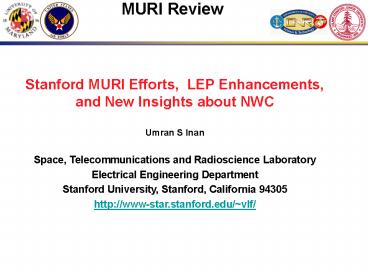MURI Review - PowerPoint PPT Presentation
1 / 50
Title: MURI Review
1
MURI Review
Stanford MURI Efforts, LEP Enhancements, and
New Insights about NWC Umran S Inan Space,
Telecommunications and Radioscience Laboratory
Electrical Engineering Department Stanford
University, Stanford, California
94305 http//www-star.stanford.edu/vlf/
2
Inner Belt VLF Wave-injection Experiment
3
Stanford AIP (Antenna in Plasma) Code
- Current AIP code provides a self consistent fluid
representation of the plasma dynamics in each of
three regions. - Developed for simulation in magnetized
collisionless environments.
- SHEATH MODEL
- Time-domain
- Solves Poisson-fluid system
- 4-moments (including heat flux tensor)
- WARM PLASMA MODEL
- Time-domain
- Solves Maxwell-fluid system
- 3-moments (including pressure tensor)
- COLD PLASMA MODEL
- Time and frequency domain methods
- Solves linearized Maxwell-fluid system
4
Comparison of VLF Transmitters
5
DEMETER View of ELF/VLF Activity
6
NWC Signal on DEMETER
7
DEMETER Energetic Electron Detector
- Energetic Electron Detector
- Pattern after successful DEMETER mission
- French m-sat
- High geometric factor
- High-time resolution
Detector Implanted Si S 490 mm2 (? 25 mm)
External shielding 2 mm Al
Foil for p and h? rejection 6 ?m
Mass 525 g
Power 895 mW
Energy range 0.07-0.7(2.5) MeV 256 channels
Maximum geometrical factor 1.2 cm2.ster
8
NWC-Induced Precipitation on DEMETER
- NWC-induced precipitation of gt60 keV electrons
clearly visible in both hemispheres - The narrow energy peak varies with latitude
consistently with cyclotron resonance interaction
at the geomagnetic equator - NWC-induced precipitation clearly competes well
with the natural background - Precipitation region located poleward of NWC,
consistent with theory
9
Irregularities LH Waves over NWC
10
Parrot et al., 2007
11
Irregularities are overhead while precipitation
is poleward
Oct 23, 2005
12
NWC on DEMETER
13
NWC on DEMETER
14
NWC on DEMETER
15
Lightning Induced Electron Precipitation (LEP)
(a)
(c)
(d)
(b)
16
LEP Events on DEMETER
17
Enhanced Precipitation Region Maintained by a
Thunderstorm
18
Comparison with Model Predictions
19
Possible Events overNorth America
20
Possible LEP Bursts over CONUS
21
VLF Streaks on DEMETER
22
Enhanced LEP Regions
23
Enhanced LEP Regions
24
Enhanced LEP Regions
25
Enhanced LEP Regions
26
LEP Time Profile Energy Spectra Inan et
al.,1989
- Represents best LEP case measured in orbit before
DEMETER - Whistler intensity was taken to be Bw200 pT
- Geometric factor was 0.17 cm2-sr
- 700 counts/s for 0.2 s is only 140 counts
- Typical geometric factors of 0.001 cm2-sr give
lt1 counts even in this best case scenario - DEMETER IDP has geometric factor of 1.0
cm2-sr
Theory
Data
Data
27
LEP Pitch Angle Distribution Inan et al.,1989
- Even in the best LEP cases, electrons just enter
the very edge of the loss cone - Very small addition of new electrons into the
loss cone must be detectable
28
Inan et al., 1982 1988
29
LEP as Benchmark for RBR Assessments
- Lightning-induced precipitation is a significant
contributor to radiation belt loss in the
inner-belt and slot regions - Individual LEP bursts have been detected on
satellites and on the ground - Quantification of wave-induced precipitation
requires that individual LEP bursts be measured
together with whistler-mode waves - Powerful lightning discharges illuminate the
radiation belts with waves of intensities of 10
to 200 pT - Waves generated for RBR must compete well with
lightning in order to significantly affect
electron lifetimes
30
Lightning-induced Electron Precipitation
31
(No Transcript)
32
Lightning-induced Electron Precipitation
33
Subionospheric VLF Remote Sensing
Many VLF transmitters operate worldwide,
providing a range of coherent laser-like signals
with which to probe the ionospheric regions
through which they propagate
34
Holographic Imaging of Lower Ionosphere
VLF receivers at 13 high schools Provides
excellent opportunities for outreach
35
(No Transcript)
36
Non-ducted LEP Events
(a)
(c)
In general whistler waves propagate in non-ducted
mode, illuminating large regions of the
radiation In each event, onset delay (Dt)an
onset duration (td) are measurable, corresponding
to wave/particle travel times and duration of LEP
pulse
(d)
(b)
37
Spatial Extent of LEP Events
VLF Amplitude Data for 24 March 2001
Dashed line VLF paths perturbed solid line ones
are not theoretical precipitation region
superposed
- Full extent of the ionospheric disturbance
produced by an LEP burst (due to a single flash)
is captured - Corresponding region of the inner radiation belt
is affected by whistler waves from a single
lightning flash
38
Theoretical Modeling
Peter and Inan 2006
39
VLF Sensing of Ionospheric Disturbances in Europe
40
AWESOME North Africa Existing Planned
41
Global Detection of LEP via VLF Paths
42
NLK-Walsenburg
43
NAA-Crete
44
NWC-Adelaide
45
NPM-Palmer
46
Dt 1.28 sec DA 0.9 dB td 1.95 sec tr 162
sec
47
Dt 1.33 sec DA 1.0 dB td 1.88 sec tr 185
sec
48
Dt 1.95 sec DA 0.9 dB td 9 sec tr 223 sec
49
The End
50
VLF Wave-Injection with HAARP































